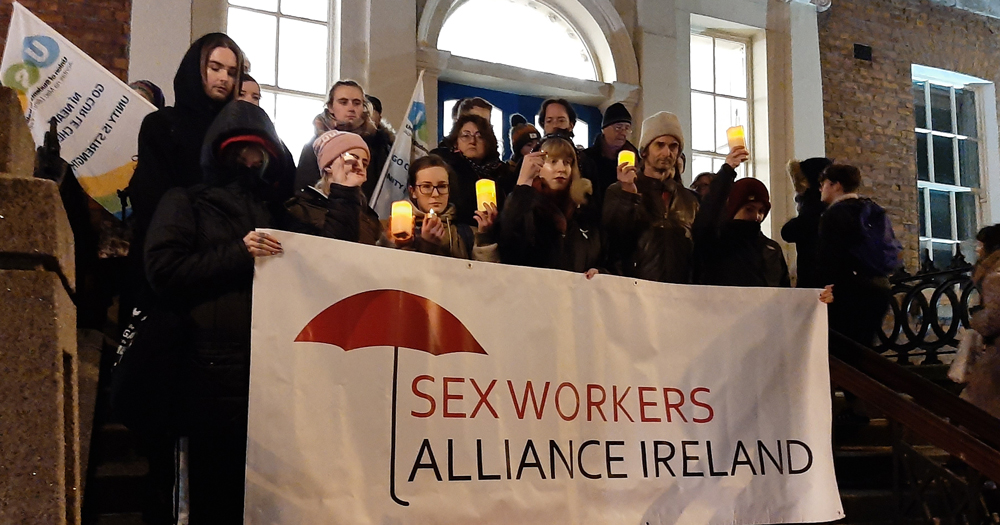Sex Workers Alliance Ireland (SWAI) addressed widespread structural violence against sex workers in a powerful call to decrim for safety on International Day to End Violence Against Sex Workers.
On December 17, SWAI will be holding a socially distant candlelit vigil at Leinster House to commemorate International Day to End Violence Against Sex Workers. This global act of solidarity has become a vital call for action in supporting sex workers against structural and physical violence.
In commemoration of International Day to End Violence Against Sex Workers, SWAI reviewed the level of structural and physical violence against sex workers in Ireland across 2020. They addressed a lack of resources, such as financial support, ongoing stigma, and laws which forced many into precarious situations.
These laws have kept us isolated by ensuring we work alone or forcing us to break the law when we work together with another worker for safety. Poverty is brutal and taking away our options does nothing to increase our safety #IDEVASW pic.twitter.com/YNF9WiZOxg
— Sex Workers Alliance Ireland (SWAI) (@SWAIIreland) December 17, 2020
Director of SWAI Kate McGrew stated, “This year the review of the sex work laws has begun and we worked to ensure that sex worker’s voices were heard in the policy decisions that govern our lives. These laws have kept us isolated by ensuring we work alone or forcing us to break the law when we work together with another worker for safety.”
“Poverty is brutal and taking away our options does nothing to increase our safety. These laws have increased violence against us and only by fully decriminalising sex work will we begin to remedy that and centre the safety of sex workers,” McGrew continued.
As SWAI note in their review, 2020 has seen a noticeable rise in violence against sex workers as many were left without a form of income and targetted under discriminatory Irish laws. In a call to decrim for safety, McGrew stated, “Demand for sex work was severely reduced this year and yet there were little to no supports for sex workers. Laws that are based on ideology instead of worker safety are state-supported violence against us.”
In September 2020, sex workers shared their experiences under the current legal system in Ireland as part of a submission to the Department of Justice. Their accounts will be considered in the Swedish Model review.
The Swedish Model was brought into effect in 2017 through the Criminal Law (Sexual Offences) Act, which criminalised the purchase of sex rather than the selling of sex. Five months after the Swedish Model was brought into effect, there were 1,635 reports from sex workers concerned about clients on the Ugly Mug app, a 61% increase from the year prior.
Reflecting on 2020 and the growing demand to decrim for safety, McGrew shared, “Our laws should ensure safety for these new workers, not put them in more danger as they have since 2017. In the last few weeks, the sex worker community has been devasted by blow after blow. Scotland is currently consulting on introducing the Nordic Model and the UK passed its first reading on legislation to introduce End Demand laws there too. These laws are being introduced for moral reasons with no evidence that they work. Sex workers are being ignored again about the reality of lives and our safety.”
Today is International Day to End Violence Against Sex Workers.
Sex workers are at risk of multiple human rights abuses including violence and rape, often with little or no protection from the law. #IDEVASW @SWAIIreland pic.twitter.com/Iw8iEjCz9U
— Amnesty Ireland (@AmnestyIreland) December 17, 2020
Although 2020 proved challenging for many sex workers, the community continued fighting for recognition and safety. SWAI launched a hardship fund during the first lockdown to support over 170 people and also created harm reduction guidelines for those who could not give up work.
In December 2020, SWAI was awarded their first Irish funding in a landmark moment of recognition for the team’s dedicated work. They were granted €20,168 for their Peer-Led Sex Worker Outreach Programme by Rethink Ireland from Innovate Together 2020 COVID Fund.
Looking back on the year, McGrew declared, “Despite the constant cruel stigma, laws that have made us less safe and a society that wishes we weren’t there, we are resilient and we deserve to be heard.”
© 2020 GCN (Gay Community News). All rights reserved.
Support GCN
GCN is a free, vital resource for Ireland’s LGBTQ+ community since 1988.
GCN is a trading name of National LGBT Federation CLG, a registered charity - Charity Number: 20034580.
GCN relies on the generous support of the community and allies to sustain the crucial work that we do. Producing GCN is costly, and, in an industry which has been hugely impacted by rising costs, we need your support to help sustain and grow this vital resource.
Supporting GCN for as little as €1.99 per month will help us continue our work as Ireland’s free, independent LGBTQ+ media.
